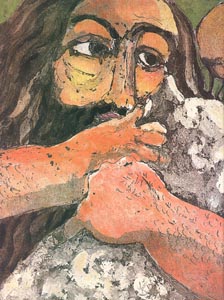Discovering the Biblical Moses
Moses’ story is told in the Book of Exodus, but it starts in Genesis with the story of Abraham and his family with whom God makes a covenant. Generations later the Biblical Moses draws the extended family together in the form of a nation with a structure and code of law, given to him on Mount Sinai. Below, Peter Machinist explores the story of Moses, the Exodus hero, in “The Man Moses.”


The Exodus hero Moses. The Biblical Moses, portrayed here as a shepherd in a print by contemporary Israeli artist Mordechai Beck, protectively clasps a sheep in his arms. Photo: Mordechai Beck.
Some might say that God himself was the Exodus hero, but in human terms the Biblical Moses takes center stage throughout the whole Pentateuch. Who was Moses? A rather solitary leader, one with his people but set apart, even in his childhood, when he was raised by the pharaoh’s daughter as if he were an Egyptian prince. Set apart also in that he married an alien wife—Midianite or possibly Ethiopian. Even his physical characteristics—a speech defect—set him apart from others and is accommodated by God who arranges a leadership duo with Moses and his priestly brother Aaron. His role was unique—even to receiving the Law and seeing God, as evidenced by Moses’ blinding countenance.
The Biblical Moses also has an unusual death. God says he must die alone on a mountaintop outside the promised land. Who was Moses? We might say he was a man who was a son of Abraham who led the people but was not typical of them.
In “The Man Moses,” Peter Machinist proposes that our Exodus hero is a type of anti-hero, outside the stereotype of a tribal or national leader. He might represent the people of Israel themselves, Biblically portrayed as being outsiders. Further, Moses’ otherness might also serve to turn the spotlight not on himself but on the message he delivers to the people: the Law. Who was Moses—the Biblical Moses? Who was the man chosen to meet God on Sinai and receive the Law on behalf of God’s chosen people?
Below, Peter Machinist explores the character of the Exodus hero—the Biblical Moses—in “The Man Moses.”
The Man Moses
by Peter Machinist


“You shall not cross there,” God decrees as Moses gazes across the Jordan. In this 1928 pastel by Lesser Ury, heavenly light illuminates the promised land that Moses has sought almost all his life but will never enter. Rather, Moses dies on Mt. Nebo—a strange and solitary death for a strangely solitary man. The biblical portrayal of Moses as distant and unapproachable, as the only biblical leader to see God “face to face” (Deuteronomy 34:10), presents Moses as representative of the Israelites—a people apart. At the same time, it encourages readers to concentrate more on the law he gave than on the life he lived. Photo: Hans-Joachim Bartsch/Collection Jüdisches Museum Berlin.
The introduction of Moses in the first chapters of Exodus marks a new, a second beginning in the Bible’s account of the history of Israel. The first beginning had been in the Book of Genesis with Abraham and the patriarchs that followed him. There the focus was on Israel as a family bound in relationship or covenant to its God. Moses’ beginning marks the extension of the group from family to nation, though a nation still with a strong sense of kinship. Here the emphasis is on the development of a common administration, as well as on the re-presentation of the covenant as a code of law that gives the nation its structure, without which it cannot survive.
The Moses who shepherds in this second beginning dominates the biblical narrative through the remainder of the Book of Exodus, indeed through the rest of the Pentateuch; his only rival, and ultimate superior, in narrative attention, as, of course, in other spheres, is God Himself. But this Moses comes to us as a strange and difficult person. Running throughout the narrative of Exodus, and of the Pentateuch as a whole, is the depiction of a unique individual: one with little or no precedent, solitary, not easily approachable, set apart from the very community he is born to lead.
This quality apart emerges in a variety of ways. For one thing, Moses’ origins may be in the community of Israel, yet they are not of it. The text of Exodus 2 (verses 1 and following) is at pains to assign him a genealogy within the family of Israel—at pains, perhaps, because it then has to recognize that he was adopted into the court of the Pharaoh, given his name by the Pharaoh’s daughter, and raised as Egyptian royalty. It is well known what Sigmund Freud did with this portrait,1 arguing that the Israelite genealogy was, in fact, a later, pious construction that tried to mask Moses’ true roots as an Egyptian who only subsequently took on the cause of the Israelite slaves as his own. Whether Freud’s thesis—and, as he made clear, he was not the originator of it—is correct or not, it does underscore the ambiguity of Moses’ connection with Israel in the biblical portrayal.
That ambiguity is fortified by other features of Moses’ family life. His wife, Zipporah, is not from Israel, but from the Midianites of the region of Sinai (e.g., Exodus 2:15–22), and her foreignness is later criticized by none other than Moses’ brother and sister, Aaron and Miriam, in the context of a challenge to Moses’ own legitimacy and leadership (Numbers 12). (Incidentally, the label that Aaron and Miriam pin on Moses’ wife, “Cushite,” has the effect of making her even stranger to an Israelite settled in Palestine, since it normally refers to the Ethiopians, a people much farther away from Palestine than the Midianites.) There is also the son Moses has with Zipporah: he is named Gershom, according to the biblical text, precisely because this is to memorialize Moses as outsider (Exodus 2:22).a Gershom has as well a curious genealogical niche. For while he has descendants, they are not arranged in a line of divine promise and authority such as is found with Abraham and his family (e.g., Genesis 26:2–5). Indeed, in Judges 18:30–31 (following here the textual tradition that reads the ancestor’s name as Moses, not Manasseh), we learn that Gershom’s descendants were priests to an idolatrous cult in the Israelite tribe of Dan.
As for the character of Moses’ leadership, here too there is difference. He is assigned, for example, a traditional title in Israel, that of prophet—a title first given to Abraham (Genesis 20)—but he is unlike Abraham and the others, for as Deuteronomy comments: “There has not arisen a prophet since in Israel like Moses, whom Yahweh knew face to face” (Deuteronomy 34:10; cf. Numbers 12:6–8). To be sure, in another biblical encounter, Moses is not allowed to see God’s face, but only His back (Exodus 33:20–23); still that encounter leaves Moses a preternatural, even divine sheen, which once more sets him apart: “When Aaron and all the people of Israel saw Moses, his face was all aglow with radiance (qaµran), and they were afraid to come near to him” (Exodus 34:30)—just as, one may add, they had been afraid to go near to God and His quaking mountain of Sinai (Exodus 19).
Become a Member of Biblical Archaeology Society Now and Get More Than Half Off the Regular Price of the All-Access Pass!
Explore the world’s most intriguing Biblical scholarship
Dig into more than 9,000 articles in the Biblical Archaeology Society’s vast library plus much more with an All-Access pass.
Even apparent defects or negatives in the character of Moses become occasions on the part of the biblical authors to find superlatives of uniqueness. Thus, in the confrontation with Aaron and Miriam, the sinful effrontery of their challenge to Moses emerges all the more clearly in the description of Moses at the opposite extreme: “The man Moses was very meek, more than all humanity that was on the face of the earth” (Numbers 12:3). And when God commands Moses to free the Israelites from Egypt, and Moses protests his competence to challenge the Pharaoh because of a speech defect—a “heaviness of mouth and heaviness of tongue” as the text says (Exodus 4:10)—this defect is turned, by God, into the basis of a new arrangement, wherein Aaron shall do the speaking, and Moses will direct him as though he were God Himself (Exodus 4:16).
Finally, there is the matter of Moses’ death, at the end of the Pentateuch in Deuteronomy 34. It flatly contradicts the pattern of expectation that the biblical narrative had accustomed us to, namely, that promises would be fulfilled and lives would reach closure. For Moses is not allowed to die in, let alone enter, the land promised to Israel already in patriarchal days—the land that he had been divinely commanded to return Israel to, without any indication, initially, that he would be barred from it (so Exodus 3, 6:2–9). Indeed, at the end Moses cannot even be buried in the promised land, as key patriarchal figures had been, including Jacob and Joseph, who had died outside of Israel (Genesis 49:29–50:14, 24–26; Joshua 24:32–33). Rather, Moses dies and is buried outside of the land, across the Jordan River in Moab, a region otherwise often at odds with Israel; and he is buried in a spot unknown, placed there not even by human hands, but by God alone. Now the Bible, it has to be noted, tries to explain this end; yet it succeeds in doing so only by a series of incomplete and obscure reasons (Numbers 20, esp. 6–13; 27:12–14; Deuteronomy 3:26; 4:21; 32:50–52)—a situation that later Jewish commentaries, in turn, made desperate efforts to fill out and discuss, if not to clarify.2 All of this, thus, only serves to underscore what an extraordinary fate Moses is given in the biblical text, and how well it echoes and rounds out the equally strange picture of his origins in, but not of, Israel.
For the Bible, in sum, Moses is indeed a man apart—apart not only from the people he guides and the land to which he directs them, but apart also, in many fundamental ways, from the kinds of leaders the previous generations of patriarchal figures had been. He remains the permanent outsider, a unique and towering figure.
Watch full-length lectures from the Out of Egypt: Israel’s Exodus Between Text and Memory, History and Imagination conference, which addressed some of the most challenging issues in Exodus scholarship. The international conference was hosted by Calit2’s Qualcomm Institute at UC San Diego in San Diego, CA.
The question that remains is why should this be so, and what does it mean. Three possibilities, at least, come to mind. First, one might say that, considered from a broader historical perspective, Moses’ characterization is not completely surprising. The stories circulating in many societies often picture their founders as different from the rest, even as distant—in short, as heroes. Yet if Moses in some sense belongs to this common type, in other ways he is an unusual, perhaps rare mutation of it, since, in his excessive modesty, distance, inexplicable fate, and strangeness, he is a kind of anti-hero: someone who does not easily serve in the native tradition as a role model, someone who cannot really be emulated.
Moses’ strangeness in the Bible may also be understood as a mirror of Israel as a whole, for Israel, too, is portrayed as the quintessential outsider, without easy parallel or precedent, to the other nations around it and to the religions and cultures they represent. Indeed, Israel is an outsider to the very land which its God promises it and which it then has to make its own in a continual struggle. Or, as the prophet Balaam exclaims, “Behold a people dwelling alone, and not reckoning itself among the nations” (Numbers 23:9).
Thirdly, and lastly, by focusing on Moses as outsider, and especially as remote, inimitable outsider, the Bible ends up by shifting the emphasis away from who Moses is to what he communicates, namely, to the Law and to God as its source. We face, then, the paradox that the towering character of Moses may be stressed in the Bible, at least in part, precisely to efface him, so that his message may emerge more clearly and sharply. In other words, there is no cult of personality here—that is, no cult of human personality—and this comports with a more general strain of ambivalence in the biblical corpus toward human leaders and the limits of human authority (e.g., Judges 8:22–24; 1 Samuel 8–10; Hosea 8:4, 13:9–11). If the ultimate emphasis, therefore, is on Moses’ message, on the laws he mediates from a totally nonhuman source, we must observe, as a final point, that this is a message which, against the person Moses, is not remote or inimitable. For the laws it offers are laws designed for the human community: laws that, however difficult, all can carry out (e.g., Deuteronomy 29:10–14; 30:11–14), and must carry out if they are to complete the process by which “God created humanity in His image” (Genesis 1:27).
Who, then, is Moses, as the biblical authors see him? Despite the complexities of their portrayal, he is at the core the appointed one who brings Israel to “serve God on this mountain [Sinai]” (Exodus 3:12), and so to receive the Law for their lives.
This essay is a revised version of one originally published in the Harvard Divinity Bulletin 27:2/3 (1998); copyright the president and fellows of Harvard College.
“The Man Moses” by Peter Machinist originally appeared in Bible Review, April 2000. The article was first republished in Bible History Daily in February 2012.
Notes:
1. Sigmund Freud, Moses and Monotheism (1939; New York: Vintage Books, 1955; German original: Der Mann Moses und die monotheistische Religion [1939]).
2. See James L. Kugel, The Traditions of the Bible (Cambridge, MA: Harvard Univ. Press, 1998), pp. 856–859, 885–887; S.E. Loewenstamm, “The Death of Moses,” in G.W.E. Nickelsburg, Jr., ed., Studies on the Testament of Abraham (Missoula: Scholars Press, 1976), pp. 185–217.


